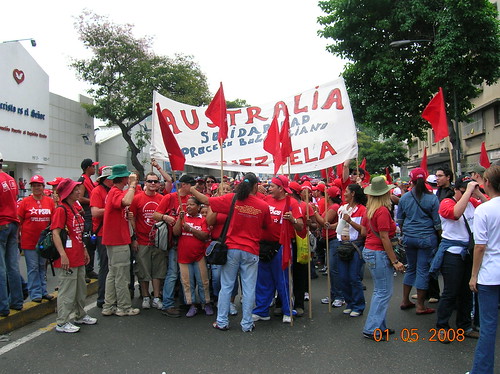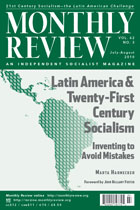latin america
Venezuela's process of struggle

Jason Netek looks at the political situation in Venezuela -- and why international solidarity is key to furthering the process of workers' power.
July 22, 2010 -- Socialist Worker (USA) -- The Bolivarian Republic of Venezuela is the focal point of a political shift to the left that has affected most of the Latin American continent for just over a decade. For years now, we have heard denunciations of the nation and its president, Hugo Chávez, from TV personalities like Glenn Beck and Pat Robertson to establishment figures like George W. Bush and Barack Obama, all of whom liken the nation to a military dictatorship.
It's no good pointing out to these types that the US actually has propped up real military dictators in efforts to stave off leftist movements all across the continent. They are fully aware. They are hypocrites.
Ecuador: Indigenous struggle, ecology and capitalist resource extraction

Marlon Santi interviewed by Jeffery R. Webber
July 13, 2010 -- The Bullet -- On July 5, I sat down with Marlon Santi, president of the Confederation of Indigenous Nationalities of Ecuador (CONAIE), in his office in Quito. We discussed the increasing contradictions between the demands of the Indigenous people's movement, on the one hand, around water rights and anti-mining resistance, and the positions of the government of Rafael Correa, on the other, which has labelled Indigenous resistance to large-scale mining and oil exploitation as “terrorism and sabotage”.
* * *
Can you describe your political formation and personal political trajectory?
Venezuela: Communal power in Caracas

Brazil: Left workers’ unity attempt fails

By Raul Bassi
July 11, 2010 -- An attempt to forge greater unity among militant union sectors in Brazil has imploded. The Working Class Congress (Conclat) was held in Sao Paulo on June 5-6 to try and bring together various radical union currents. The key forces behind the congress were Conlutas and Intersindical, both formed in opposition to the main union confederation, the Unified Workers’ Confederation (CUT).
The CUT unites approximately 60 million formal or informal workers out of a total population of 200 million, making it the biggest workers confederation in the continent. The CUT has had a very close relationship with the governing Workers Party (PT), both during its period of ascendency as it emerged out of the militant workers' struggles of the 1970s, as well as during its transformation to what it is today.
John Bellamy Foster on Venezuela: Marxism and `vernacular revolutionary traditions'

The following article is the Foreward to the July-August 2010 issue of the US socialist magazine Monthly Revi
Building a socialist-feminist economy in Venezuela

Lidice Navas in Caracas, Venezuela, June 18, 2010.
Lidice Navas interviewed by Susan Spronk and Jeffery R. Webber
June 30, 2010 -- The Bullet -- A long-time revolutionary activist, Lidice Navas is an important socialist-feminist leader within the United Socialist Party of Venezuela (PSUV) and a candidate for the Latin American parliament, among her many other responsibilities. We met her at the Women’s Development Bank in Caracas on June 18, 2010, to talk about her vision of socialism, the accomplishments of the Bolivarian process so far, and what remains to be done.
What is your political history?
I am a candidate for the PSUV in Caracas. I am also a member of the Political Bureau of the Region of Caracas and a candidate for the Latin American parliament. I also have some responsibilities in the Women's Development Bank (Banco de Desarrollo de la Mujer, BanMujer) and am also active as a coordinator in the parroquia [parish] El Valle, where we are trying to construct socialism from the level of the community.
Behind the New York Times' hatchet job on Oliver Stone's "South of the Border"
Trailer for South of the Border.
By Oliver Stone, Mark Weisbrot and Tariq Ali
[The following letter was sent to The New York Times.]
June 27, 2010 -- South of the Border -- The New York Times' Larry Rohter attacks our film, South of the Border, for “mistakes, misstatements and missing details”. But a close examination of the details reveals that the mistakes, misstatements and missing details are his own, and that the film is factually accurate.
Bolivia's Pablo Solon: We need 'a global movement to defend Mother Earth'

In defence of the People's Agreement -- Tanuro and Invernizzi get Cochabamba wrong

[For more information about, documents from and discussion of the World People's Conference on Climate Change, click HERE.]
By Ben Courtice
June 28, 2010 -- In their article "World People's Conference on Climate Change: Some critical comments on the People's Agreement", the Fourth International's Daniel Tanuro and Sandra Invernizzi have missed the main usefulness of this document.
They note, “The words `coal' and `natural gas' are simply not mentioned. The expression `renewable energies' is also absent” and that the document “overlooks the struggle against the capitalist energy lobbies and the sectors linked to it (cars, petrochemicals, shipbuilding, the aeronautics industry, transport …), whereas this is obviously the key question in the framework of an anti-capitalist strategy of stabilisation of the climate.”
It is true the conference did not target the hydrocarbon industries. The Bolivian hydrocarbon ministry in fact had a stall at the conference.
Venezuela: Workers’ control and the contradictions of the Bolivarian process

Gustavo Martínez interviewed by Susan Spronk and Jeffery R. Webber
June 21, 2010 – The Bullet – On June 10, 2010, we caught up with Gustavo Martinez, a union leader in the worker-controlled, nationalised coffee company, Fama de América, in Caracas, Venezuela. The company has 350 workers at the national level, with two separate plants – one in Caracas and one in Valencia. We sat down with Martínez to discuss the centrality of workers’ control in the ongoing struggle to transition toward socialism and some of the most pressing contradictions of the Bolivarian process in Venezuela today.
* * *
To start off, can you tell us your name, how long you've worked in this coffee company, your job in the company, and your role in the union?
Eric Toussaint: Venezuela's Bolivarian revolution at the crossroads?
By Eric Toussaint
[See parts 2 , 3 and 4 below.]
Comparision of the Cochabamba People’s Agreement and the Copenhagen Accord
The People's Agreement stems from an integral vision of climate change, incorporating the issue of the structural causes of the climate crisis, the rupture of harmony with nature, the need to recognise the rights of Mother Earth in order to guarantee human rights, the importance of creating a Tribunal of Climate and Environmental Justice, the development of global democracy so that the people can decide on this issue affecting and the planet and all of humanity.
On the other hand, the Copenhagen Accord represents a step backward with relation to the Kyoto Protocol by proposing a methodology of voluntary commitments for the industrialised countries that are principally responsible for climate change.